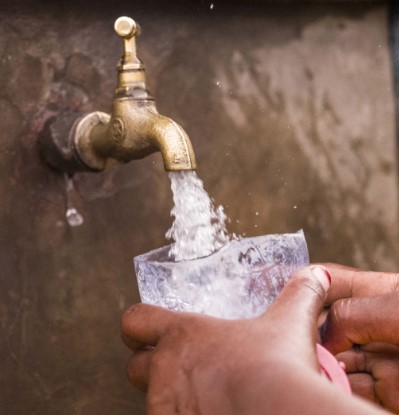Meghalaya plans to provide tap connection to all rural households by December, 2022
New Delhi: Jal Jeevan Mission (JJM) launched by Central Government last year aims to provide “Functional Household Tap Connection” (FHTC) to every rural household by 2024. Being implemented in partnership with States, the Mission aims to enable every rural household has assured availability of potable water at a service level of 55 litres per capita per day (lpcd) on regular and long-term basis. Furthering the mission target, all states are presenting their implementation plans to the National Mission headed by Secretary, Department of Drinking Water & Sanitation, Govt. of India for approval.
Meghalaya today presented the Annual Action Plan to achieve 100% household tap connections to National Jal Jeevan Mission, Ministry of Jal Shakti for approval. Meghalaya proposed 100% tap connections to all the households by December, 2022. Out of 5.89 lakh total rural households, the State is planning to provide 1.80 lakh tap connections in 2020-21. It was appreciatively noted that Meghalaya is planning to cover 1096 villages with 100% tap connection in 2020-21. Under JJM, States are given additional funds in form of performance grants based on their performances in terms of outputs achieved i.e. the household tap connections. Government of India approved Rs.175 crore for implementation of JJM in 2020-21.
Meghalaya is blessed with more than average rainfall and has abundant natural water resources. However, due to detrimental human interference, the water levels being depleted. Thus, a multi-pronged corrective approach is required by State Government. Indeed, Jal Jeevan Mission does provide a definite roadmap to the State to provide clean, potable water to its citizens in their houses, so that the women and girls do not have to face difficulty for fetching clean water. Though, it was noted that Meghalaya has so far not provided tap connections to large number of households, but the Annual Action Plan was suggestive for extensive work in coming years. To achieve that, a better implementation strategy and arrangements on village level is needed, for which the State is making elaborate arrangements.
The state is giving emphasis on the ‘low-hanging fruits’ i.e. in the villages/ habitations where piped water supply schemes already exist, so that remaining households could be provided with tap connections easily in very less time. The state plans to immediately provide tap connections to all remaining households belonging to weaker and marginalised sections of the society on priority. During the Covid–19 pandemic, it is important that people don’t crowd public stand posts/ public water sources to fetch drinking water. Therefore, State was advised for taking up water supply works in villages to provide household tap connections, which will help in practicing social distancing, and will additionally help local people in getting employment and boost rural economy.
A defined roadmap is also charted for the effective implementation of Village Action Plan (VAP) with the active participation of the rural community. Strengthening of existing drinking water sources for long-term sustainability of drinking water supply systems through convergence of various programmes like MGNREGS, SBM (G), 15th FC Grants to PRIs, District Mineral Development Fund, CAMPA, Local Area Development Fund, etc. at village level is planned for effective use of all available resources. The State has been allocated Rs. 182 Crore under 15th Finance Commission Grants to PRIs during 2020-21; 50% of this amount has to be mandatorily to be spent on water and sanitation.
While planning, thrust is given on covering households in quality-affected habitations, aspirational district, Sansad Adarsh Gramin Yojna villages, etc. on priority.
Under Jal Jeevan Mission, water quality testing laboratories at district & state levels are given priority. Community is being encouraged for surveillance of water quality. PHE Department is facilitating to empower and engage with the community. For this, action plan carried out to incorporate the various planned activities like timely procurement of kits, supply of kits to the community, identification of at least five women in every village, training women for use of Field Test Kits and reporting and collating the reports with laboratory-based findings of the water sources.
When the country is grappling with CoVid-19 pandemic, it has become very important to provide livelihood to the migrant workers who have returned to their native villages in Meghalaya. These personnel could be utilized in water supply related works especially plumbing, fitting, water conservation works, etc. in every village to ensure sufficient ground water availability leading to water security, water availability for agriculture and most importantly will help in provision of drinking water to every rural household.

